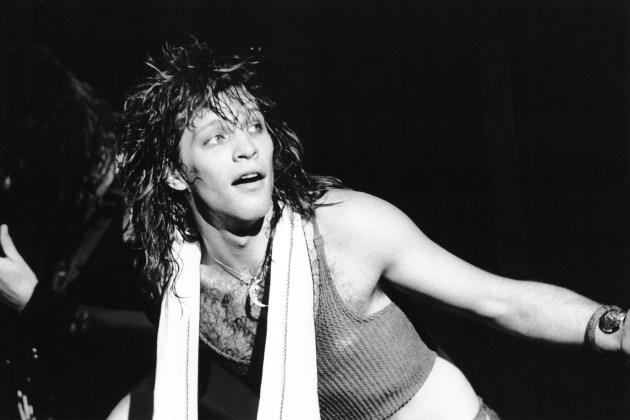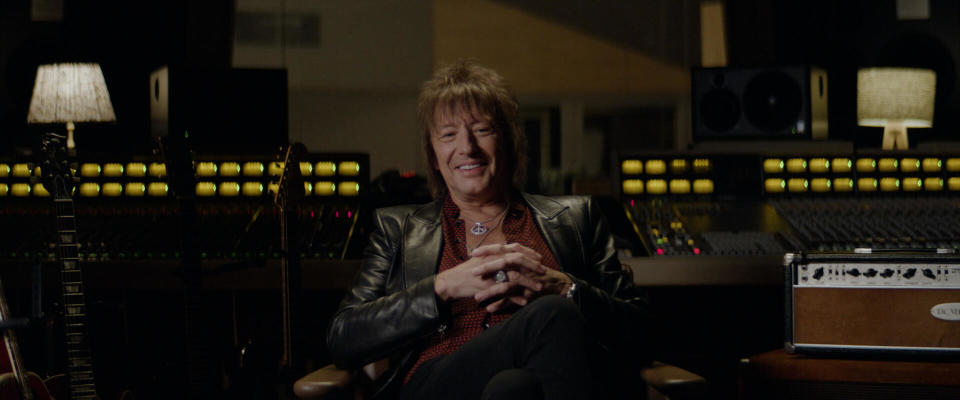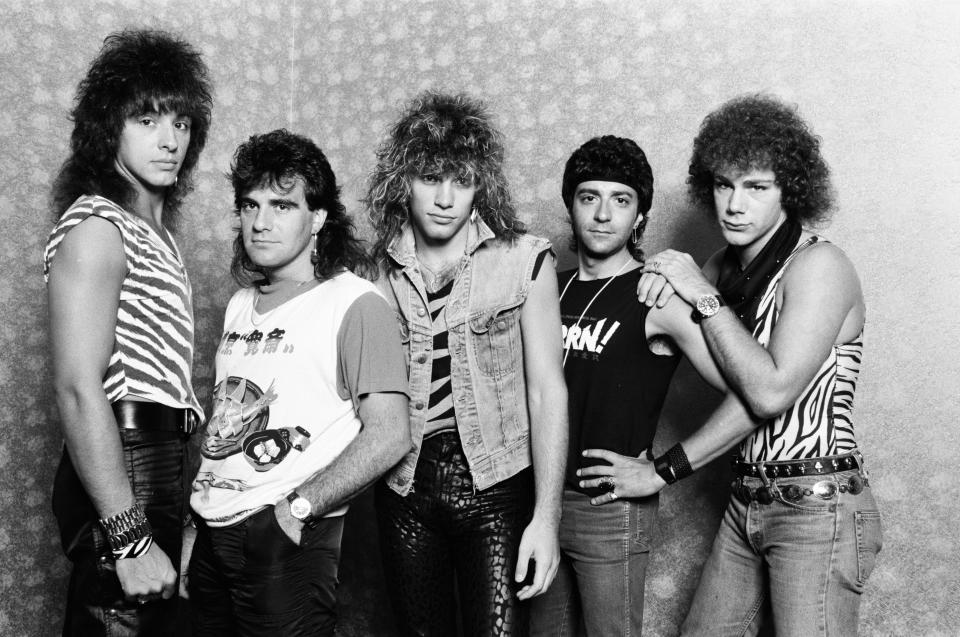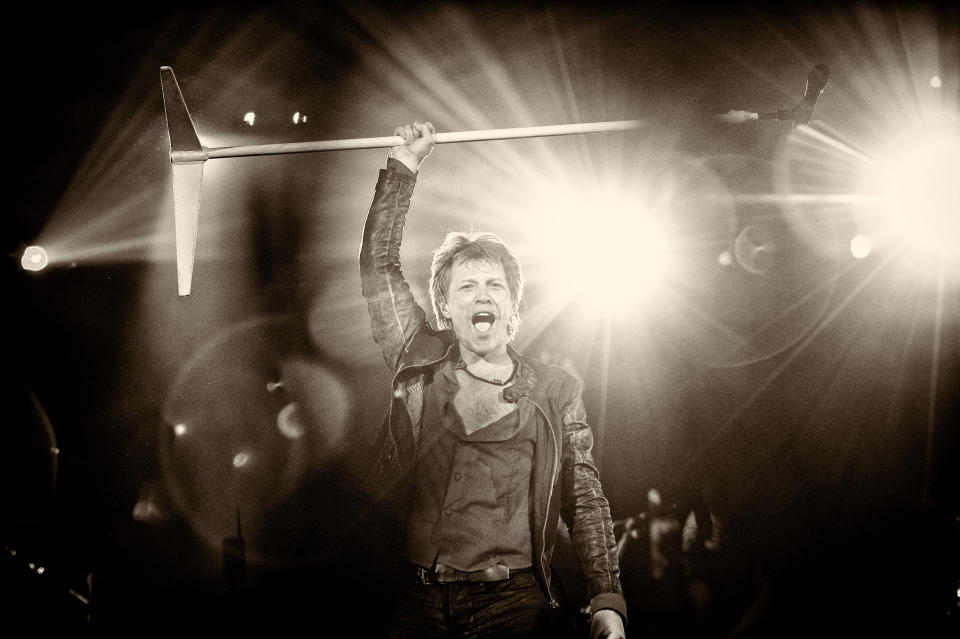Shot Through The Heart: Jon Bon Jovi Opens Up About Hulu Docuseries ‘Thank You, Goodnight’

Forty years after putting down the Power Station broom and picking up the microphone, Jon Bon Jovi is in an introspective mood.
The man who co-wrote iconic songs including “Livin’ on a Prayer” and “Keep the Faith” is preparing for the release of Hulu’s four-part docuseries Thank You, Goodnight, directed by Gotham Chopra.
More from Deadline
Initially planned as a career retrospective around the band’s 40th anniversary – Bon Jovi’s eponymous album was released on January 21, 1984 – the series added another element to the story, that of its lead singer’s health issues that have raised question marks about the band’s future.
Thank You, Goodnight, which premieres April 26, highlights the highs and lows of being in a band, the drugs and the difficulties of remaining successful and wanting to evolve but not wanting to alienate its audience, in addition to its leader’s health issues. It’s not a “VH1 puff piece,” according to Bon Jovi.
Was it tough to open up? Jon Bon Jovi, sitting in a hotel room in Los Angeles, told Deadline that it wasn’t.
“One thing I do know about a 40-year career is, if you don’t tell the truth, the lies will catch up to you,” he said. “You won’t remember who you bullshitted. It’s always best to just tell the honest-to-God truth. Then you can remember what you said. I don’t mind living that truth. Part of our continuing success is that I’m not trying to be something I used to be. This isn’t the ‘80s — I’m not here on a nostalgia tour. We have a new record coming that I’m very excited about, I’m not dying my hair, I’m not a fat Elvis, any of that horseshit.”
The series is chronological. Each episode — “New Jersey vs Everybody,” “Nowhere to Everywhere,” “Brothers in Arms” and “Legendary” – ostensibly tackles a decade in the band’s career. It kicks off with their formation in Sayreville, N.J., in 1983 after Jon spent years playing in Asbury Park with the Atlantic City Expressway, John Bongiovi and the Wild Ones and The Rest, including a memorable appearance by his hero Bruce Springsteen at The Fast Lane in 1980. “Fortunately, there was a still picture,” he said.
However, it wasn’t until he had recorded “Runaway” and it became a radio hit that he put together the band with keyboardist David Bryan, bassist Alec John Such (who left the band in 1994 and died in 2022), drummer Tico Torres and, eventually, guitarist Richie Sambora.

It’s Sambora’s appearance in the documentary that makes it sizzle. “I’m excited — are we telling the truth or we gonna lie?,” Sambora asks when he’s first introduced.
Sambora left the band in 2013. The third episode deals with his departure; addiction and family issues were involved (as well as mounting frustration over recording, in particular, a guitar part on What About Now’s “The Fighter”).
In the series, Jon Bon Jovi is asked whether he and Richie have discussed it since (they both appeared at the band’s entry into the Rock & Roll Hall of Fame in 2018). “No, not for lack of f*cking trying,” the singer says.
Jon says that he and Sambora are “fine” now.
“He came to see me in August, and we spent the night. Great, but, you know, 10 years ago, he decided to quit the band,” he said. “Everything was just fine, but we had a show that night. I’m going to try to say this the best way I possibly can: I was learning how to write songs and making songs. This is a band that I put together, that he was the last member to join. Then he really took an integral part by the third album, for sure. Then he left us 10 years ago. There was a before, so there’s going to be an after. I shouldn’t be questioned as to how I got a record deal and why I still have the record deal and why the band continues. With all due respect, and I mean this lovingly, when he left the band, we were heartbroken, but there was not a question of our continuing.”
Jon added that the “door is always open” for Sambora’s return. “Phil X has done an incredible job. John Shanks, my co-producer and buddy, he’s done nine of my albums,” he said. “We’d look like Lynyrd Skynyrd, but f*ck yeah, come on up. There’s always another guitar to plug in.”

Thank You, Goodnight started at a breakfast between Jon Bon Jovi and director Chopra, son of Deepak Chopra. The younger Chopra founded Religion of Sports with Tom Brady and Michael Strahan in 2016. He has directed series including Facebook Watch’s Tom vs. Time and ESPN+’s The Man in the Arena: Tom Brady. Jon Bon Jovi is a big Patriots fan.
“The breakfast we had was about the 40 years,” Chopra told Deadline. “Maybe we’d do four parts and break it up by decades. That was exciting and interesting. But then it was, ‘Tell me more about this tour that’s coming up’ — this was way before the surgery, and that just had real-time stakes. That was Year 39, at that point it wasn’t entirely clear if [they were] going to reach Year 40 from a performance standpoint. To [Jon’s] credit, not just his willingness to talk about it but to let it be documented.”
The band’s career was heavily documented since it began. The first two episodes features clips of its stadium slots with bands such as Scorpions and KISS following the success of its first album, the relatively poor performance of follow-up 7800° Fahrenheit, working with Desmond Child and Bruce Fairbairn on 1986’s Slippery When Wet, which became a giant hit, as did their next record New Jersey in 1988. There’s footage of the band’s journey to the Soviet Union – thanks to their manager Doc McGhee’s drug arrest – for the Moscow Music Peace Festival as well as their somewhat strange tour ender in Guadalajara.
Episode 3 takes in thoughts about retirement, his marriage to Dorothea, Jon’s solo record Blaze of Glory, the firing of McGhee and starting his own management company, his acting career (he appeared in Moonlight and Valentino, The Leading Man, Little City, No Looking Back and Sex and the City), the success of Keep the Faith, new haircuts and a visit to a psychotherapist.
Jon Bon Jovi clearly also is a hoarder, as viewers see him go through tapes of demos and lost tracks.
“I have a big space for this stuff,” he said. “Knowing that the 40th was on the horizon, because it’s about Year 38 at this point, I started thinking about it. There was bags and bags with 30 or 40 unreleased songs. There’s a couple of ’80s- and ’90s-era hits that I was like, ‘Why didn’t I put these on records?”
He added that he now is going through this archive to create a “virtual museum” of audio and video.
This comes as the band is gearing up to release Legendary, its 16th studio album, in June. But that record was made in the shadow of vocal fold medialization surgery after it became clear that Jon’s voice was not what it used to be.
He calls the vocal-cord issues “horrible.”
“Could you imagine that one cord is literally atrophy? It’s dying. The strong one is pushing the weak one, and you’re singing out of tune. I pride myself on being a singer. I’ve sung with Pavarotti. I know how to sing. Now, it’s like that athlete where you’ve got to figure it out again. I’m well into the process. But that was daunting.”
Jon Bon Jovi added that he feels the surgery was a success but that he’s “still participating in the process on a daily basis.”
“I think we did a pretty good job of covering the 40 [years],” he said. “If anything, I wish that there was an Episode 5 now, because so much has happened since we’ve wrapped.”
The majority of Bon Jovi’s peers never really made it past the ‘80s. Grunge killed off the majority of hair metal bands, and times changed. But the band kept going, and instead of relying on its previous hits, chalked up new No. 1s with such songs as 2000’s “It’s My Life” (from Crush) as well as “Who Says You Can’t Go Home” (from 2005’s Have a Nice Day).
The message seems clear: Work your ass off.
“There’s some kid in his bedroom right now that’s gunning for you,” he said. “It’s not dissimilar to being an athlete or a quarterback. There’s always somebody that’s coming up behind you. The work ethic was born out of who and what we were as children, who our parents brought us up to be. But then as you grow up, you’re proud of the work you do. You better have been good enough to ask Mr. and Mrs. Smith for their hard-earned dollar. I’m not going out on the road unless we’re great. You’ll never see the fat Elvis.”

Chopra compares him to Brady and Kobe Bryant, who he worked with on Showtime’s Kobe Bryant’s Muse.
“He’s similar just in terms of process, the work ethic, the obsession with details but constantly experimenting and especially with the healing, trying new things and very progressive in terms of all this stuff,” he said. “There’s also the resilience. He reminds me a lot of Kobe’s combativeness. Tom’s kind of a pushover, Jon is not, but that’s great. It creates tension, and that’s a good thing. You also adapt the filmmaking style around the subject.”
In the closing episode, Jon Bon Jovi says that he’s been “incredibly blessed” over the past 40 years, so “if it’s time to turn left, not bad.”
But did he ever worry about making a documentary about the band’s legacy while it was still going?
“Hence the title — Thank You, Goodnight, because no one knows the ending.”
Best of Deadline
2024 Premiere Dates For New & Returning Series On Broadcast, Cable & Streaming
'Wednesday' Season 2: Everything We Know About The Cast, Premiere Date & More
Hollywood & Media Deaths In 2024: Photo Gallery & Obituaries
Sign up for Deadline's Newsletter. For the latest news, follow us on Facebook, Twitter, and Instagram.


